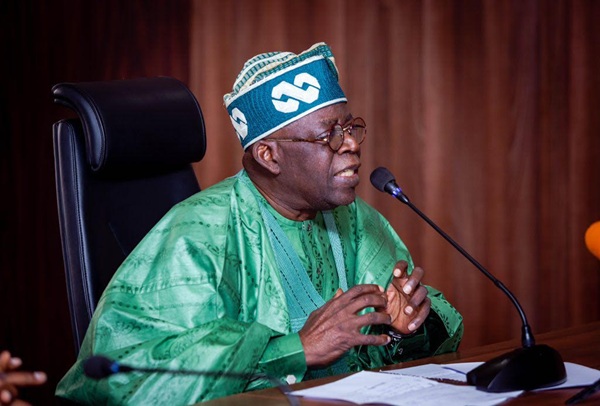Nigeria’s President Bola Ahmed Tinubu has called on Nigerians to commit to building the country. He inaugurated and renamed the National Arts Theatre the Wole Soyinka Centre for Culture and Creative Arts.
According to the Governor of the CBN, Olayemi Cardoso, the revamped centre for culture and creative arts, completed in 1976, had fallen into disrepair and cost the Central Bank of Nigeria (CBN), the Bankers Committee, the Ministry of Arts and Culture, and the Lagos state government a total of N68 billion to renovate to meet global standards.
Speaking at the reopening of the edifice, President Tinubu, whilst noting that the country is replete with great talent, urged Nigerians both at home and abroad to stop painting the country in a negative light.
According to him, Nigeria is a nation of proud people. “So let me take this opportunity to say one thing that is very important to me, to you, and to Nigerians in diaspora. That is, stop talking about Nigeria in a negative tone. Nigeria is a country of very proud people. We know what we are.
“It’s about ourselves, believing. Something we inherited from our parents and great forebears, a nation of brave people, confident and dedicated. Let’s build it together. Let’s rechristen it. This country will succeed. And it’s with you, myself, and many other people, who might not be here, that we enjoy the glory and reap the fruits.”
He also charged the CBN governor with putting together an endowment fund to ensure that the national monument of culture and arts does not fall into disrepair again.
“It is now left for Cardoso and others to assemble an endowment fund. And I’m going to be a contributor. And it’s not bad for us to use this opportunity to create jobs, maintenance, accessibility, and commitment.”
At the reopening, CBN Governor Mr Olayemi Cardoso described the project as “a rebirth of Nigeria’s cultural heartbeat,” stressing that the investment was not a corporate social responsibility gesture but a deliberate stake in the nation’s creative future.
“This centre stands as proof that when the public and private sectors unite behind a shared national purpose, there is no limit to what Nigeria can achieve,” Cardoso said, recalling the journey of restoring the once-neglected structure into a world-class creative hub.
“Sixty-five years after our nation’s founding, we affirm that Nigeria’s creative spirit is alive, pervasive, and shaping global culture. This edifice has stood for nearly half a century as a proud symbol of our heritage. Completed in 1976 and inaugurated at FESTAC ’77, it became a beacon of African creativity and a repository of our shared history. Many here will recall its golden years of cultural vibrancy and the long neglect that followed. Even in silence, however, the Theatre remained the soul of our cultural identity, awaiting revival. Today, that day has come.
“The journey was not without challenges. Structural complexities, contractual issues, and even the global pandemic extended the timeline beyond expectations. Yet our resolve never wavered. This project was especially close to the President’s heart, and his vision transformed it from a restoration into a symbol of national renewal.
“The Central Bank of Nigeria, the Bankers’ Committee, the Lagos State Government, and the Ministry of Art, Culture, and the Creative Economy came together with a shared purpose to deliver this national project, with the Bankers’ Committee alone committing approximately N68 billion, not as corporate social responsibility but as a deliberate investment in Nigeria’s cultural future. This project proves that when the public and private sectors unite behind a shared national purpose, there is no limit to what Nigeria can achieve.
Also speaking, Lagos state governor Babajide Sanwo-Olu, who described the reopening as celebrating the rebirth of a national icon, said, “National Arts Theatre — now rightfully renamed the Wole Soyinka Centre for Culture and Creative Arts — stands as the heartbeat of our nation’s creative spirit.
“It is a reminder that culture drives development and is the foundation of identity, unity, and national pride. Nearly 50 years ago, in this same hall, Nigeria hosted FESTAC ’77, a historic festival that welcomed Africa and the Black diaspora from across the world.
“Today, as we rededicate this edifice, we reaffirm our commitment to nurturing the creative energies of our people and preserving this cultural landmark for generations to come.





